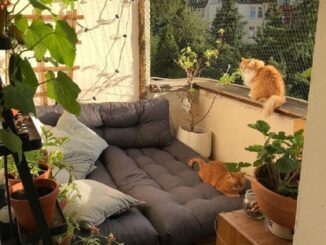If you’ve been following my work for some time now, you’ll know that I’m a big advocate of plant pairings, especially when it comes to herbs.
However, certain herb combinations just don’t go very well together.
In this article, we’ll discuss what these combos are and explain to you why it isn’t a good idea to pair these herb varieties together. Let’s dive straight into it!
1: Mint & Any Other Herb

🌱 Get Your FREE 2025 Sowing Calendar! 🌱
Plan your best garden yet! This printable 2025 Sowing Calendar tells you exactly when to plant your favorite vegetables, herbs, and flowers for a thriving garden all year long.Get My FREE Calendar
Now, mint is a personal favorite plant and I absolutely love the fragrance it adds to the garden. However, one thing you must know is that mint is invasive and will overtake nearby herbs, competing not only for nutrients but also space.
If you want to grow mint, it’s better not to pair it with anything and grow it separately in a pot or container to limit spreading.
2: Dill & Carrots

Fortunately but also unfortunately, dill and carrots belong to the same family and can often cross-pollinate, which negatively affects both their flavor and growth. Therefore, it isn’t the best idea to pair these two together in the garden.
Ideally, you want to plant dill away from carrots but near cucumbers so they offer their pest-repellent properties effectively.
3: Basil & Sage

As much as I love both these herbs and actually have tried pairing them together in my garden (it didn’t go so well), they both just have different requirements and thrive in substantially different conditions. Basil prefers moist soil, while sage shines in drier conditions, making them poor companions.
A better idea would be to grow basil near tomatoes and sage near rosemary or lavender instead.
🌱 Get Your FREE 2025 Sowing Calendar! 🌱
Plan your best garden yet! This printable 2025 Sowing Calendar tells you exactly when to plant your favorite vegetables, herbs, and flowers for a thriving garden all year long.Get My FREE Calendar
4: Fennel & Almost Everything

Yeah…fennel is just one of those herbs I guess…
Trust me, I thought I could find an exception to this rule, some herb, bush, or vegetable plant that would thrive in the company of fennel. But, unfortunately, fennel is just like that one kid at school who nobody wants to play with. It releases certain chemicals that stunt the growth of most nearby plants, including other herbs.
Grow fennel in a completely separate pot or at least away from other herbs if you want to.
5: Rosemary & Basil

🌱 Get Your FREE 2025 Sowing Calendar! 🌱
Plan your best garden yet! This printable 2025 Sowing Calendar tells you exactly when to plant your favorite vegetables, herbs, and flowers for a thriving garden all year long.Get My FREE Calendar
Like basil and sage, rosemary and basil have immensely different watering and soil requirements. Rosemary loves dry, well-draining soil, while basil needs consistent moisture to be able to thrive. While the two can be extremely fragrant in the garden, they definitely shouldn’t be paired.
A better approach to pairing these herbs would be to grow rosemary with thyme and basil with parsley. These are much more harmonious combinations.
6: Chives & Beans

As strange as this pairing sounds to the ears, it’s actually not that uncommon. Many gardeners plan on growing chives and beans together but later wonder why their bean growth slowed down. It’s mainly because chives release compounds that slow the growth of beans.
A better alternative to this is to grow chives near something like tomatoes to help repel pests as well as contribute as a companion plant effectively.
🌱 Get Your FREE 2025 Sowing Calendar! 🌱
Plan your best garden yet! This printable 2025 Sowing Calendar tells you exactly when to plant your favorite vegetables, herbs, and flowers for a thriving garden all year long.Get My FREE Calendar
7: Oregano & Marjoram

Oregano and marjoram can unfortunately cross-pollinate and alter each other’s flavor profile. It doesn’t necessarily mean the herbs will taste bad or anything; they just won’t have the same flavor you would expect them to have, which definitely isn’t ideal.


